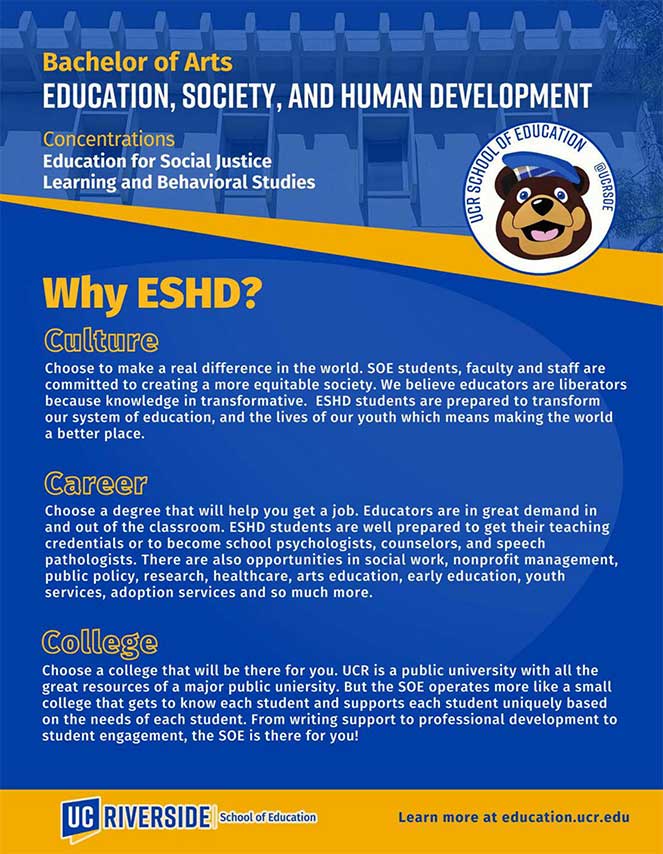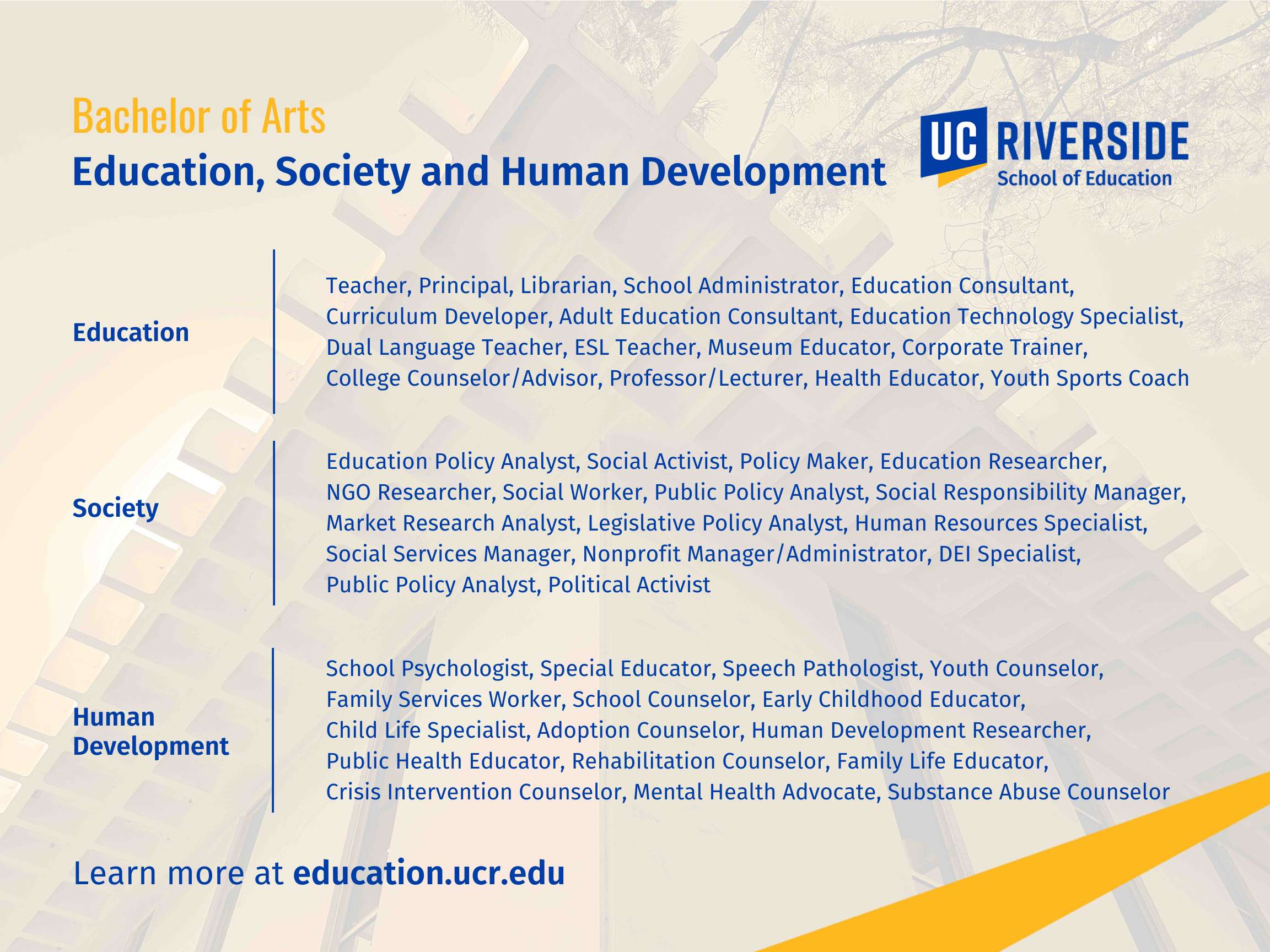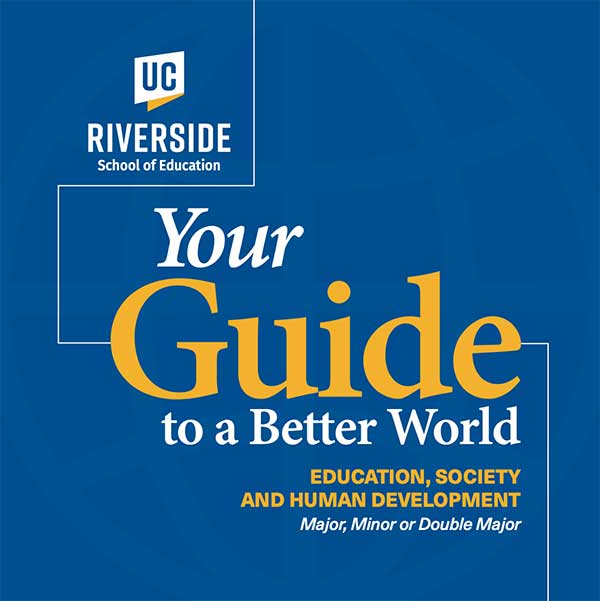
Education can change the world. Learn how here.
A Degree that Rewards You in More Ways than One
-
Multiple Career Options
A career in education has so many rewards – financial, emotional and intellectual. And so many jobs.
Of course there are teachers, administrators and school counselors. But education can also take you into specialized careers in STEM education, special education, bilingual education and speech pathology. School psychology is a fast-growing field along with education IT. Many students choose to work in the public sector as policy administrators or education researchers. And education professionals are needed in the healthcare and social work fields from helping families manage autism to helping patients manage the emotional strain of cancer or other illnesses.
Whether you work in education or not, a BA in Education, Society, and Human Development provides a foundation for understanding how to help, support and teach others to become the person they aspire to be – which is truly the greatest reward of all.
-
YOU can Make a Difference
Many people today want to make a difference in the world and a BA in ESHD prepares students to do just that. Our mission is based on advancing more equitable systems and practices in the field of education. But our culture is defined by acceptance, tolerance and a deep belief in educational and social justice.
ESHD students will gain perspective on society and develop ideas that can make the world a better place. The SOE takes on the status quo. Faculty, students and staff are always looking for a better way, a new way, a solution that works for all – not just the few.
We believe educators are liberators because knowledge is transformative. If you want to transform the world, this is the degree for you.
-
All in a Small College Environment
The UCR School of Education gives you the best of both worlds. UCR is a large, public university with all the resources of a major university. We have D1 athletics, brand new residence halls, modern recreation facilities, multiple dining facilities, hi-tech classrooms and many, many student groups covering the great variety of interests of our diverse student population.
Yet, SOE students feel as if they attend a small college. They have access to a devoted Research and Writing Support Center. They participate in a professional development program called Community Engaged Learning. Students can join Learning Communities, get advice from Peer Academic Advisors and attend fun events organized by Student Ambassadors.
At the SOE, our focus is on the whole student: academic, social, emotional and professional. We mean it when we say We’re Here for You!
FAQs about the ESHD Degree
-
What is ESHD?
The UCR School of Education (SOE) offers a Bachelor of Arts in Education, Society, and Human Development. We call it ESHD. Watch our video to learn more.
-
Is ESHD just for teachers?
A BA in ESHD is an excellent foundation for all sorts of careers in and out of the classroom including education, public policy, social work, healthcare, IT, nonprofit management, even athletics.
See the list in our brochure for a list of career paths. The truth is education impacts everyone either as a child or an adult because education affects our society.
If you want to teach, a degree in ESHD will prepare you to create more equitable systems and practices inside a classroom. If you don’t want to teach, a degree in ESHD will prepare you to advance more equitable systems and practices throughout your life.
-
Can I teach after getting my BA in ESHD?
In order to teach in a California public school classroom, you have to earn your teacher credentials. You can obtain those credentials in our Teacher Education Program (TEP) offered on both our Riverside and Palm Desert campuses.
Our TEP allows you to get your master’s plus credentials or just your credentials in one year. They also offer programs in bilingual authorization and special education. For more information, visit education.ucr.edu/tep/welcome or attend one of their Information Sessions to get all the scoop and ask questions.
-
What are the concentrations in ESHD?
You can choose from two different concentrations: Education for Social Justice or Learning and Behavioral Studies. While the concentrations will lead your course decisions at the upper level, there are many courses that are the same for both, so the foundational learning is the same for both. This also means it’s easy to switch, if you start off on one concentration and want to switch to other.
Watch our video on Education for Social Justice to learn more.
Watch our video on Learning and Behavioral Studies to learn more.
-
Can I double major in ESHD and another major?
Yes, in fact a significant number of our students are double majors in psychology, sociology, liberal studies, ethnic studies, public policy, anthropology and more. Our BA is very complimentary to all of those degrees and often have the exact same GE requirements so it’s usually a fairly simple process to apply for a double major.
What does that mean for you? First off, you can get two degrees in exactly the same amount of time as you can get one, so it won’t cost you extra. More importantly, a second major shows you have a wider range of experiences, learning and skills on your resume as you seek your first job or if you change careers. Plus, a student who has two degrees is even more desirable for grad programs and makes their application even more appealing.
-
Does ESHD prepare me for grad school?
Absolutely. Whether you want to pursue a career in teaching, school administration, education policy, research, school psychology, special education, social work, nonprofit management or more, an ESHD degree strengthens your grad school application by displaying a great range of research and field study plus a great ability to articulate your arguments for change.
You will leave ESHD as an Equity Warrior ready to fight to make a difference in grad school, in your career and in your life.
-
What are the next steps?
Schedule an appointment with a Student Ambassador or sign up for one of our SOE Undergraduate Information Sessions. Ask them questions. Be honest. Tell them what you like and any concerns you have. Share your plus and minus list and let's discuss it together. We want to help.
To get in touch, contact us at soecomm@ucr.edu with your questions or tell us if you’d like to meet in person or on zoom. We’re here for you!



